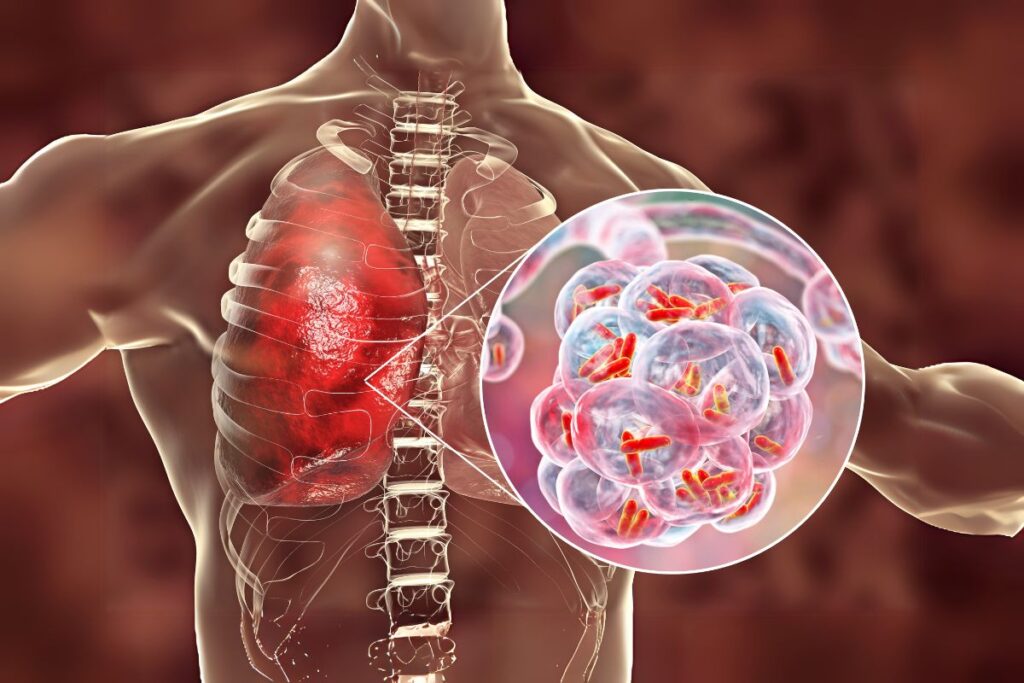An illness that causes inflammation in one or both lungs’ air sacs is called pneumonia. These air sacs (alveoli) may fill with fluid or pus, causing difficulty in breathing, coughing, and chest pain. Viruses, fungus, bacteria, and even chemical irritants can cause it. While treatable in most cases, pneumonia can become severe, especially in young children, the elderly, and people with weakened immune systems.
Symptoms: How to Recognize Pneumonia Early
Pneumonia symptoms can vary from mild to severe, depending on the cause and the patient’s overall health. Look out for:
● Fever: Often high, accompanied by chills and sweating.
● Cough: persistent and productive, with mucus that may be green, yellow, or bloody.
● Shortness of breath: difficulty breathing, especially when doing some physical activity.
● Chest pain: An intense or stabbing pain that worsens when you breathe deeply or cough.
● Fatigue and weakness: Feeling drained, even after resting.
● Confusion: Common in older adults, often the first noticeable symptom.
In severe cases, pneumonia can lead to bluish lips or nails, rapid breathing, and dangerously low oxygen levels.
What Causes Pneumonia?
The type of pneumonia depends on its cause:
1. Bacterial Pneumonia:
● Most commonly caused by Streptococcus pneumoniae.
● Symptoms often develop quickly, with high fever and chest pain.
2. Viral Pneumonia:
● Caused by viruses like influenza, RSV (Respiratory Syncytial Virus), or SARS-CoV-2 (COVID-19).
● Symptoms may be milder but can worsen quickly in vulnerable individuals.
3. Fungal Pneumonia:
● Common in people with weakened immune systems or chronic illnesses.
● Caused by fungi like Histoplasma or Cryptococcus.
4. Aspiration Pneumonia:
● Happens when food, drink, or vomit is inhaled into the lungs, causing infection.
Who Is at Risk?
Anyone can get pneumonia, but certain groups are more vulnerable:
● Young children: Immature immune systems make them more susceptible.
● Elderly adults: Natural aging weakens the immune system.
● People with chronic illnesses: Conditions like asthma, COPD, or heart disease increase risk.
● Smokers: Smoking damages lung tissue and impairs natural defenses.
● Weakened immunity: HIV/AIDS, cancer treatments, or organ transplants can lower the body’s ability to fight infections.
How Is Pneumonia Diagnosed?
Diagnosing pneumonia usually involves:
● Physical Exam: Listening for crackling, bubbling, or rumbling sounds in the lungs.
● Chest X-ray: Reveals the extent and location of the infection.
● Blood Tests: Identify signs of infection and inflammation.
● Sputum Test: analyzes mucus to pinpoint the infection’s cause.
● Pulse Oximetry: Measures blood oxygen levels.
In severe cases, further tests like CT scans or bronchoscopy may be required.
How Is Pneumonia Treated?
Treatment depends on the severity and the type of pneumonia.
1. Medications
● Antibiotics: Depending on the type of bacteria, antibiotics are used to treat bacterial pneumonia.
● Antivirals: for viral pneumonia caused by flu or COVID-19.
● Antifungal medications: for fungal infections.
● Over-the-Counter Medicines: To reduce fever and manage pain.
2. Rest and Hydration
Staying well-hydrated and getting enough rest is critical for recovery.
3. Hospitalization
Severe cases may require:
● Intravenous Antibiotics and Fluids.
● Oxygen Therapy: To maintain adequate oxygen levels.
● Mechanical Ventilation: For respiratory failure in extreme cases.
Preventing Pneumonia
Prevention is always better than cure. Here’s how you can protect yourself and your loved ones:
1. Vaccines:
● Pneumococcal vaccines protect against bacterial pneumonia.
● Flu and COVID-19 vaccines lower the chance of viral pneumonia.
2. Hygiene Practices:
● Wash hands regularly and properly.
● Cover your mouth when coughing or sneezing.
3. Quit Smoking:
● Smoking damages the lungs and raises the risk of infection.
4. Boost Your Immune System:
● Include healthy foods in your diet, exercise regularly, and get enough sleep.
5. Avoid Sick Contacts:
● Stay away from people with respiratory infections if you’re at high risk.
How HealthPil Can Help:
At HealthPil, we provide access to experienced pulmonologists who can diagnose and treat pneumonia effectively. Whether you need a teleconsultation for mild symptoms or urgent advice, our platform ensures you get the care you need quickly.
We also offer reminders for vaccines and health check-ups to keep your lungs healthy.
Myths About Pneumonia
- Myth: Pneumonia is just a severe cold.
Truth: Pneumonia is a serious lung infection that requires medical attention. - Myth: Antibiotics cure all types of pneumonia.
Truth: Antibiotics work for bacterial pneumonia but won’t help viral or fungal cases. - Myth: Only elderly people get pneumonia.
Truth: Anyone can get pneumonia, especially those with weakened immunity or chronic conditions. - Myth: You can’t get pneumonia if you’ve had the vaccine.
Truth: Vaccines reduce the risk but don’t eliminate it completely.
- Myth: Pneumonia is just a severe cold.
FAQs About Pneumonia
Is pneumonia contagious?
Yes, bacterial and viral pneumonia can spread through respiratory droplets, but fungal pneumonia is not contagious.
How long does it take to recover from pneumonia?
Mild cases may resolve in 1-2 weeks, but severe cases can take months.
Can pneumonia come back after treatment?
Yes, especially if risk factors like smoking or chronic illnesses persist.
What should I do if I suspect pneumonia?
See a doctor immediately, especially if symptoms are severe or worsening.
Can children get pneumonia?
Yes, young children are particularly vulnerable to pneumonia due to their developing immune systems.
Disclaimer:
This article is for informational purposes only and is not a substitute for professional medical advice. If you or someone you know is experiencing symptoms of pneumonia, seek medical attention immediately.
Don’t ignore the signs. Protect your lungs. Connect with HealthPil today for expert guidance and care.

